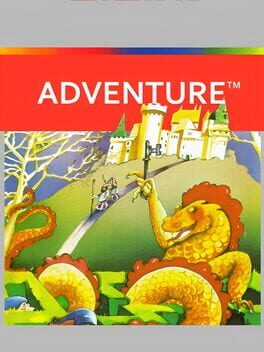

Adventure is a video game for the Atari 2600 video game console, released in 1980. In the game, the player controls a square avatar whose quest is to hunt an open world environment for a magical chalice, returning it to the golden castle. The game world is populated by roaming enemies: dragons, which can eat the avatar; and a bat, which randomly steals and hides items around the game world. Adventure was designed and programmed by Atari employee Warren Robinett, and published by Atari, Inc. At the time, Atari programmers were generally given full control on the creative direction and development cycle for their games, and this required them to plan for their next game as they neared completion of their current one to stay productive. Robinett submitted the source code for Adventure to Atari management in June 1979 and soon left Atari. Atari released the game in early 1980.
Reviews View More
It is curious for Colossal Cave Adventure to be one of the main sources of inspiration. It isn’t unexpected that it was taken as a source, as there must not have been many successful examples at the time in the search of adventure, but in how the paths diverged, almost reactionary. Adventure gets rid of words altogether to commit to a total physical world. Consequently, contrary to what abandoning immediate realism may imply, the world of Adventure becomes much more intuitive and believable. There is no longer the conflict of having to puzzle out what kind of commands a word processor is able to understand or not in order to move forward, there is instead the discovery of a system that, while allowing itself to be much simpler, is also much more transparent.
You can grab objects and drop them, birds can also carry (and steal) objects, magnets attract objects contained in the same screen, bridges allow you to cross walls (or whatever they are)... All these rules are not broken at any time and lead to a world that, as Tim Schafer says in the Atari 50 Collection, seems alive, that is able to exist even if the player is not present. Thus, birds can carry away a dragon, a key, a magnet attracting a key, or the player can peek sections of the world while traveling defeated in the belly of a dragon. This contributes in two areas: one of wit from being able to use the available elements in our favor to avoid or tackle obstacles, and another of unpredictability, chaos and life, because given the rules the dislocations of all the elements throughout the map during the game are more than certain. There is always a factor that requires improvisation while continuing the discovery.
It’s difficult to explain how well Adventure applies multiple abstractions to its advantage since many of them have been irremediably absorbed by everything that would come after. As Terry Cavanagh understood in Mr. Platformer, paying homage to similar early titles such as Atari 2600’s Pitfall or Montezuma’s Revenge, these first videogame steps that began to understand abstraction also began to use it as a liberating language. Where entering through a door into a fortress was teleporting into a labyrinth, moving past the edge of the screen was discovering a new piece of the world and doing so repeatedly on the same side discovered a spatially impossible loop.
It's a process of genuine discovery because it doesn’t attempt to clumsily replicate reality, but rather to discover new ways of navigating, interacting and understanding a world. And in the face of all these new, impossible and abstract forms remains a strong, direct and unmistakable sensation: Adventure.
